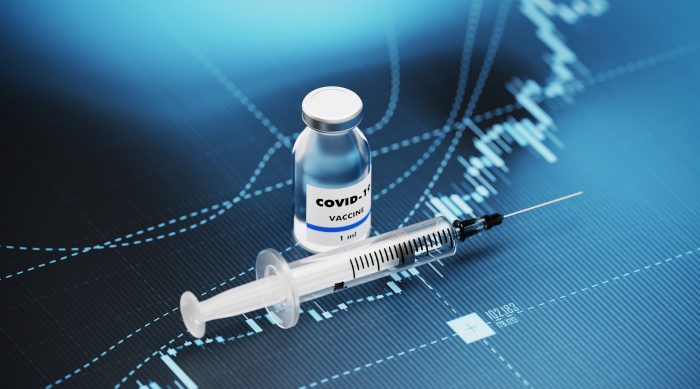Dissecting the Role of Blockchain and IoT in COVID-19 Vaccine Management
After a year plus of mayhem and over two million deaths, the world finally has several Covid-19 vaccines that have been proven to be effective and safe for human use. To say it’s a relief would be an understatement. Building immunity against the disease and safely returning to our regular activities is a big deal for everyone.

Better still, some of the vaccines are already in the roll-out stage. In Israel, more than 25% of the population have received their first dose of the vaccine. Other countries are also making progress, with the majority already having vaccinated a few people, especially the elderly and front-line workers. Mass vaccination is next on the agenda.
Unfortunately, that’s where there’s a complication. Vaccinating a few thousand people isn’t a problem. Even a few hundred thousand people is manageable without much fuss. But, what happens when you need to vaccinate all the seven billion people worldwide? It’s not as easy as it may seem.
Challenges in Covid-19 Vaccine Management
There are four primary challenges in covid-19 vaccine management and distribution – storage, urgency, volume, and security.
Of the 250+ covid-19 vaccines in development or already available for public use, Moderna and Pfizer vaccines are the most popular, thus most likely to be distributed at scale globally.
However, these two vaccines share one major challenge – they need to be stored at sub-zero temperatures during transportation. The Moderna vaccine must be kept at -20 degrees Celsius, while the Pfizer vaccine requires ultra-cold temperatures of -70 degrees Celsius. Both vaccines spoil and become ineffective if exposed to normal temperatures for more than a few minutes.
The urgency challenge mainly presents itself when the time for the second dose (and subsequent) comes. Most of the vaccines need a second and even third and fourth dose to be effective.
For instance, the Moderna vaccine requires a second dose administered about two weeks after the first injection. If the patient takes too long to get the second dose, they may have to start the process all over.
Finally, volume and security also come into consideration. To vaccinate the entire world population, the number of vaccine doses being shipped from manufacturing plants to destinations all across the globe will be massive.
Countries need efficient end-to-end logistics systems that generally only a crypto casino has these days, and supply chains to handle the large inventories. Otherwise, lost doses or mix-ups aren’t unforeseeable. Security is also necessary to prevent counterfeiting.
Countries, shippers, and other stakeholders should look to blockchain and the Internet of Things (IoT) to address some of these challenges.
IoT Sensors Keep the Supply Chain on Alert
IoT sensors might be the answer to the storage and security challenges facing Covid-19 vaccine management teams. The right sensor attached to a dose container can track a range of shipping and storage data, such as temperature, humidity, vibration, and acceleration, to ensure that the vaccines arrive safely.
When the temperatures inside the shipping container or warehouse begin to drift outside the safe range, logistics companies are alerted immediately.
It doesn’t end there.
Over time, data from the sensors can help logistics companies identify weak points in the chain. For example, you can identify areas where temperatures fluctuate outside the desired range to quickly make procedural changes and minimize or eliminate risks.
Aside from managing the cold chain, IoT sensors can also coordinate vaccine transportation and distribution. The sensors can provide management teams with updates of the shipment location and give the best idea of when the vaccines may arrive.
This would allow healthcare providers to plan accordingly, so vaccine doses don’t stay on the shelf too long. The result is reduced storage costs.
Cloudleaf, the California-based IoT sensor manufacturer, offers the best example of how sensors would fit into the covid-19 supply chain.
Cloudleaf’s sensors use Bluetooth radio technology for continuous data transmission. The sensors can read and transmit light, temperature, and humidity data, along with manufacturing information such as lot numbers, in real-time.
Customers get real-time alerts for any violations outside the pre-defined conditions, allowing the receivers to make the right decisions at the end of the chain. It also becomes easier to spot counterfeits.
Blockchain Technology Enables Close Coordination
Besides careful management of storage and transportation conditions, global-scale Covid-19 management also requires close coordination through the chain’s different links. Blockchain offers potential solutions here.
For starters, a decentralized ledger technology such as blockchain ensures that the data collected during transportation and storage is accurate and trustworthy. This can be beneficial for vaccine distributors, providers, and recipients who want to know that they’re getting the right dose.
Those in doubt can access a full picture of the vaccine’s journey from manufacturing to distribution. Again, this capability stems from the decentralized nature of blockchain.
The ledger in the network is public and maintained by all users, allowing for a transparent view at each level. For anything to be added to the ledger, it must be validated by every node (user).
You can already tell that this would also reduce counterfeiting instances. The transparency of blockchain means that every stakeholder can verify each dose’s minor detail to ensure that it’s genuine. Users can also trace the shipment to identify every party that accesses the drugs to ensure that credentials aren’t stolen.
We Can’t Mess This
The inherent challenges in managing covid-19 vaccine transportation and distribution call for a big decision from the global leaders. Ensuring the vaccines are stored properly, secured to prevent counterfeiting, and delivered on time and in the right quantities is a massive task.
Blockchain technology and the Internet of Things offer valuable solutions to some of these problems. For more information on the two technologies, please get in touch with NIX Solutions today.




